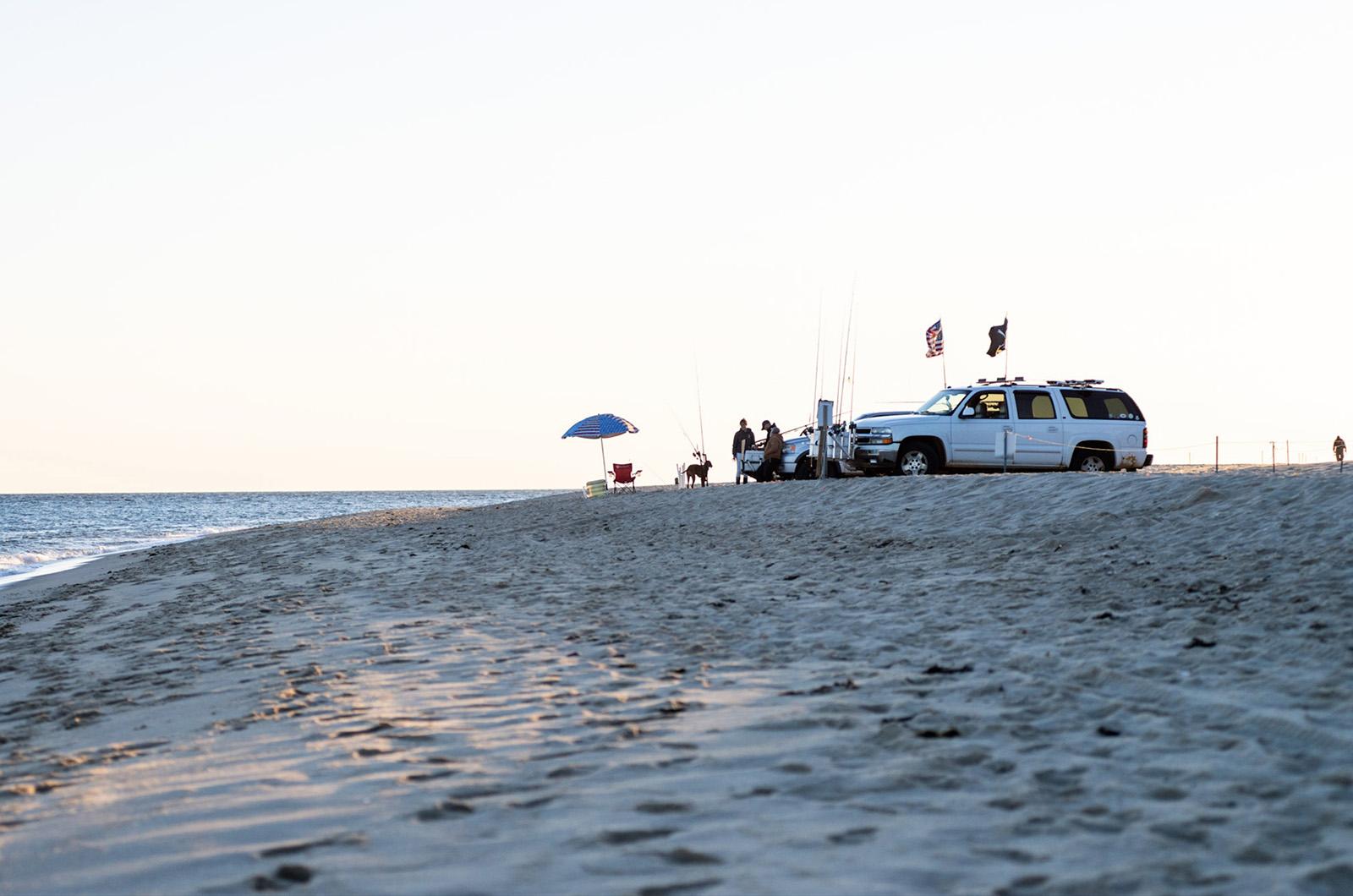Just weeks ahead of the unofficial start to summer, Chappaquiddick’s oversand vehicle trails are looking a lot more like battle lines.
This week, The Trustees of Reservations, the nonprofit that manages the 16 miles of Chappy trails popular with beachgoers and fishermen, publicly objected to proposed regulations from the Edgartown conservation commission, saying the rules are not aligned with state environment law and instead were formed with local politics in mind.
“That has nothing to do with the ecology and the protection of the beach, that has to do with what the landowners want,” Trustees president Katie Theoharides said in an interview with the Gazette.
Ms. Theoharides said her organization plans to push back on proposed vehicle limits from the conservation commission, as well as protest the commission’s ban on vehicles driving past the Cape Pogue lighthouse to a stretch of shoreline prized by fishermen. If necessary, the Trustees is also willing to take its concerns to the state in order to seek overriding approval, she said.
These protestations, echoed by the Trustees in letters to the town, indicate that the conservation commission’s draft regulations unveiled late last month will not be the end of a long-running, contentious fight over access to Chappaquiddick’s pristine shore and leave some beachgoers hoping for a denouement.
“This has been a long, bruising fight and we just have to move forward,” said Jonathan Herman, a member of the Martha’s Vineyard Beachgoers Access Group and seasonal Chappy resident.
At the Edgartown Conservation Commission’s April 24 meeting, commissioner Geoff Kontje outlined draft regulations that would allow 30 vehicles at a time on Cape Pogue and 200 across the Trustees’ Leland and Wasque properties. The contested trail from the lighthouse to the Gut, which is currently the subject of a lawsuit between neighbors and the Trustees, would be off limits.
The conditions came after more than two years of back and forth about how the Trustees would manage the beaches on Chappy.
At that meeting, Mr. Kontje expressed hope that the new rules could settle the issue and get people out on the beaches for the season.
“We’re into the fishing season now, just at the very beginning of it, so I think this is a good time to consider voting on this,” he said.
But the limits have also drawn opposition from several groups, including fishermen and Chappaquiddick homeowners, in addition to the Trustees.
The Trustees had proposed 300 vehicles across all the properties, and it remains against setting separate limits for the different properties.
Officials with the Martha’s Vineyard Striped Bass and Bluefish Derby were also concerned by the limits on Cape Pogue.
“The Derby respectfully requests that the vehicle capacity limit be increased to 50, which would more accurately reflect the capacity of Poge assuming an ocean facing travel (with parking) corridor,” derby committee chair Phil Horton and derby director John Piekos wrote in a letter to the conservation commission.
But Cape Pogue residents have felt the vehicle caps are too high, potentially leading to worsening conditions along the shore.
“There is no room for 30 cars to play north of Tom’s Neck,” resident William Gazaille wrote in a letter to the conservation commission. “Allowing so many cars to recreate on a resource with no room for them invites people to drive off the established trail and damage the resource.”
The Trustees have said the busiest day on Chappaquiddick recorded about 300 vehicles, and the organization would be requesting changes to the conservation commission’s caps. Ms. Theoharides said she would be open to limiting access to 200 vehicles across all properties, getting rid of the proposed bifurcated limits proposed by the conservation commission.
Ms. Theoharides’ previous job was as the state secretary of energy and environmental affairs in the Baker-Polito administration. She contends that the new regulations by the conservation commission are not based in scientific fact, or backed by the state Wetlands Protection Act, but instead prioritize the interests of private landowners on Chappaquiddick and would limit public access to the beaches.
“The commission wrote this order of conditions not based on science of the Wetlands Protection Act, but really based on politics,” she said.
Rachel Self, another Cape Pogue resident who has pushed against the Trustees plan, contended that the Trustees have never provided credible evidence to justify its plan for the beaches.
“[The Trustees] has numerous experts in the field available to them,” she wrote in a letter to the conservation commission. “Scientists, environmental engineers, biologists and coastal engineers on the payroll and even on property on Martha’s Vineyard. Why hasn’t the applicant provided a single person who could offer credible, reliable evidence on the non-adverse impacts of recreational OSVs on the resource at any of the hearings?”
The conservation commission also proposed a condition where the Trustees would have to appear before the commission monthly to report on how operations on Chappaquiddick were going. The commission sought reports on vehicle counts, the number of staff and trail closures.
In general, the Trustees’ argued the town was overreaching in its proposed regulations, stretching beyond the confines of state law into nitty gritty details such as where fees were collected and signage. The Trustees attorney also said that while open lines of communication were welcome, the law has no requirements for any such monthly meetings.
As evidence of conditions aimed at appeasing homeowners, Ms. Theoharides pointed to Norton Point, where the conservation commission put only five conditions on Edgartown’s plan to run its oversand vehicle program. But the commission’s proposed conditions for the Trustees amount to nearly 30.
If the conservation commission insists on what the Trustees considered overreaches, Ms. Theoharides said the Trustees could seek a superseding determination from the state Department of Environmental Protection on the issue — vaulting over the conservation commission’s authority.
The nonprofit felt that the issues would be better addressed in a joint agreement outside of the regulatory conservation commission process guided by state law.
“Again, we appreciate the Commission’s efforts to accommodate multiple interests,” the Trustees’ attorney wrote to the town. “But that may be the source of the problem: an order of conditions is not the place to balance multiple interests, but only those interests protected by the Wetlands Protection Act and its regulations.”
The conservation commission is set to take up the draft regulations at its May 15 meeting. Mr. Kontje declined to comment on the Trustees’ statements, saying he didn’t think it was appropriate with the hearings ongoing.
Conservation commission permissions aside, the conditions of the beach have also shut down travel on bayside trails for months, and the town has raised concerns about the condition of the Dike Bridge bulkhead, potentially threatening access to all of the beaches.
Several residents on Chappaquiddick said the Trustees have not maintained the area and said the town should pull back and look at the overall health of the beaches.
“This entire dispute before this commission will become moot when Mother Nature weighs in,” David Tyler, owner of a home on the Cape Pogue Gut, wrote to the commission.
The Trustees may also need to go to the planning board to reapply for a special permit, as well as deal with the ongoing lawsuit with Cape Pogue residents, which has a hearing scheduled for June.
Mr. Herman with the beachgoers group hoped that the conservation commission would keep the current rules, which allow vehicle access to Leland, Wasque and up to the Jetties, in place if the battle rages on.
But he wished everyone would take a breath and let the historical vehicle access continue in whatever shape the shifting sands allow.
“This can’t stay in limbo forever,” Mr. Herman said. “We have to just move forward, whatever it’s going to be.”









Comments (17)
Comments
Comment policy »